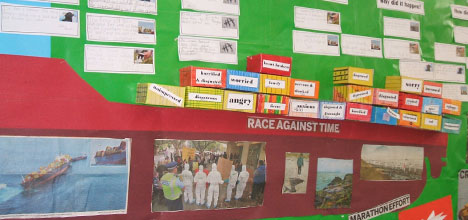The Rena disaster is providing education opportunities for children in the region with students from Bellevue Primary School among those using the situation in their study.
The 236m cargo ship ran aground on Astrolabe Reef on Wednesday, October 5 and has since leaked hundreds of tonnes of oil into the water and lost 88 containers overboard.
Students at Bellevue Primary School chose to study the Rena disaster as a class project and made this diagram to show their feeling about it.
Teacher Louise Peters says the children have chosen to study the Rena because the disaster is happening in their part of the world.
'Knowledge gained from local community issues gives ownership to students and allows them to feel part of the community, hopefully building strong opinions and feelings for our environment.
'This disaster was an ideal starting place to understand the world and the issues we all face together.”
She says the students were unaware of the true scale of the Rena disaster when lessons on it began.
'Many didn't understand the enormity of the event and the many different problems arising from it.”
The learning began with class-wide brainstorming to compile their combined knowledge of the event.
'Some had been to the beach with family while others knew of family who had helped. Some knew very little.
'The discussion was long and quite animated with many opinions as to why and how it happened.
'First they combed through all the newspapers – I had kept them throughout the break – and checked the internet for reports and photos.
'They read articles, cut out pictures and spent time in groups looking at headlines and sharing thoughts about what they meant.
'Sharing what they knew and read from all the articles helped to gather information and allowed them to predict future outcomes for the community, our country and the planet.”
One of the many things students learnt from the project was that oil spills are a common occurrence around the world.
Louise says students saw for themselves the damage oil spills have done to other countries' coastlines.
'They discovered the many ways that oil spills occur and the extraordinary problems involved in cleaning up.
'They were shocked at the amount of oil carried for fuel on one ship and how long it takes to pump it off – they also experimented and saw how oil on water spreads.”
Louise says they shared thoughts about the wildlife and the community and how everyone's been affected, including the number of workers required for all the different jobs involved.
'I found a diagram of the Rena and some students copied the outline onto coloured paper for the wall. They created 3D container shapes and wrote their feelings on them.”
She says they intend to follow the salvor's progress until the ship is finally clear of the reef and document how long it is until people are allowed on the beach.



0 comments
Leave a Comment
You must be logged in to make a comment.